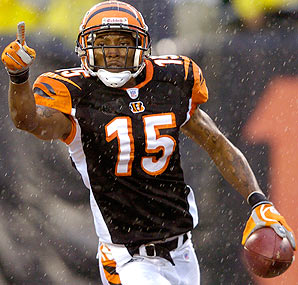Bengals owner Brown on Henry: 'He was starting to blossom'
And then he died.
The power of redemption is no match for the power of tragedy. There will be an investigation as to how Henry, 26, wide receiver for the Cincinnati Bengals, happened to fall from the bed of a moving pickup truck driven by his fiancée, Loleini Tonga, in Charlotte, N.C., at about noon Wednesday. The sleuths will offer a cause of death, clinically. No one will ever be able to say why it had to happen. Cause without reason.
"Just at the time he was running to daylight,'' said Bengals president Mike Brown, "his life was snuffed out.''
Henry died at 6:36 a.m. Thursday, in a Charlotte hospital. He leaves his fiancée and four children, three of his own, and the forever wonder of what might have been. That's always the question the young leave us with. Said Brown, "He was starting to blossom.''
It was Brown who proclaimed himself "a redeemer'' and re-signed Henry in August 2008, over the public objection of Bengals coach Marvin Lewis. If Henry were a symbol of all that was wrong with the Bengals between 2006 and 2008, so was Brown, the forgiving owner prone to social work with miscreant players.
Henry wasn't the first player to whom Brown had thrown a rope; he was just the most visible. If you needed a photo of Chris Henry, you browsed the police blotter first, then the team media guide. Drug charges, gun possession, DUI, drinking with underaged girls in a northern Kentucky hotel room. Pretty much the whole bad-boy catalog.
Wasn't that Chris Henry who waved a gun at a police officer on a crowded Orlando, Fla., street a few years ago?
Yes, it was.
The Bengals released him in April '08, after his fifth arrest in 28 months. That time, Henry was charged with assault and criminal damaging, for breaking a car windshield during an argument on a downtown Cincinnati street. That time, he didn't do it. The man who did didn't come clean until the investigation made it obvious. That was after a local judge referred to Henry as "a one-man crime wave.''
Henry's story was not that much different from those of many young NFL players: Talented kid leaves college, drafted highly (3rd round, 2005), gets more money than he's ever seen, hooks up with people he thinks are friends, starts doing stupid, illegal things, believes he'll never get caught.
After Hurricane Katrina destroyed Henry's family home in suburban New Orleans, his extended family came to live with him in Cincinnati. He supported them all. He also ran with some of them. They ran astray.
"Chris could never figure out that some of these people were dragging him down,'' Lewis said. Henry wasn't a bad guy, in the malicious sense. Just very easily led. Then came the charges in April '08, when none of his buddies had his back and Henry realized, as Lewis put it, "these people are not here for my benefit. He distanced himself from [them]. That's when his whole life, his whole career, turned around.''
Henry ditched the hurtful friends, met his fiancée and began the business of career rehab. By all accounts, he was serious. The cure was ongoing. "He was going to have the future we all wanted for him, and he wanted for himself'' was how Mike Brown put it Thursday.
The few teammates present in the Bengals' dressing room Thursday said only nice things. Henry, they said, was kind, gentle, soft-spoken. The teammate they knew in the past two years was not a thug or a criminal or the poster-guy for all that ails the NFL's image. "Heavily misunderstood,'' Carson Palmer called Henry.
"He wasn't the Chris of his rookie year or second year,'' said guard Bobbie Williams. "Chris was responsible, dependable, loved football. He had made the changes he needed to make.''
Henry was always a home-run hitter on the field. He averaged 13.6 yards a reception as a rookie in '05; the following year, the average was 16.8 yards on 36 catches, including nine touchdowns. Before he broke his arm this year against Baltimore on Nov. 8, Henry had 12 catches for almost 20 yards a catch, and two TDs.
The Bengals likened him to Randy Moss, a 6-foot-4 leaper with speed to get deep. Even when Henry wasn't catching a lot of passes, he was stretching the field for Chad Ochocinco and Laveranues Coles. Palmer marveled at Henry's potential.
He was starting to figure things out when he died. His career was a partially opened package. There will be a cause of death. But not a reason. The Bengals didn't give up on Chris Henry. Henry didn't give up on himself. Maybe that's the lesson, if you're looking.
"Hearts ache around here,'' Bobbie Williams decided.





